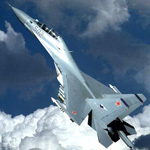India to buy 42 new SU-30 MKI

Russia will provide an additional 42 Sukhoi frontline fighters to India under an agreement signed today, taking the bilateral defence cooperation to new heights. With this pact, the total number of acquired or contracted aircraft by India in various stages of manufacture of the frontline SU-30 MKI fighters increases to 272. The agreement for the upgraded Sukhois was signed by Defence Secretary Shashi Kant Sharma and Russian Federal Service for Military-technical Cooperation Director MA Dmitriev in the presence of Prime Minister Manmohan Singh and President Dmitry Medvedev after their talks at the 12th annual Indo-Russian Summit at the Kremlin.
The pact, which was among the five agreements initialled between the two countries, came against the backdrop of a crash of an Indian Air Force’s Sukhoi-30 near Pune.
The mishap, in which the two pilots ejected safely, raised some technical questions and also led to the grounding of the entire fleet of 120 planes pending investigations.
An Inter-Governmental Agreement (IGA) and a general contract were signed in 2000 for the manufacture of 140 Su-30 MKI aircraft by HAL. A 2007 protocol envisaged manufacture of a further 40 aircraft.
Earlier, 50 Su-30 aircraft were purchased in phases prior to the signing of the IGA and the deliveries started in the late 90s.
The new version is expected to include a new cockpit, an upgraded radar and certain stealth features to avoid radar detection.
Significantly, the upgraded Sukhoi-30 MKIs will be able to carry a heavier weapons load, especially the airborne version of the Brahmos cruise missile. India is also looking to upgrade most of its SU-30 MKIs in the long run.
The first delivery of the upgraded Sukhois is expected in 2014 and the last by 2018.
According to present projections, India plans to phase out 120 MiG 21s by 2017 and with the MMRCA still not a done deal, the SU-30 MKI fleet will be the mainstay.
At their joint press conference, Medvedev said Indo-Russian Military-Technical Cooperation has reached “unprecedented levels” while Prime Minister Singh saidthis has reached ‘qualitatively new levels.”